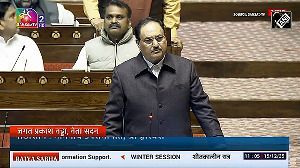Just five days after mandating all listed companies to have a minimum 25 per cent public float, the government said on Wednesday indicated it was open to a review of the new rules. "If there is need for any modification, correction, amendment, or may be amplification, it will be done," Finance Secretary Ashok Chawla told reporters on the sidelines of a function by the Confederation of Indian Industry.
He said the ministry and the disinvestment department were getting representations from public sector companies and other stakeholders on difficulties in implementing the rules, which require at least 5 per cent annual equity dilution if a listed firm had less than 25 per cent public holding.
When asked about action against companies failing to comply with the norms, Chawla said delisting was the biggest penalty. "Not automatically, but there is a possibility," he added.
Analysts said the reasons behind Chawla's comment could be the feedback the finance ministry is getting from various market players, as well as companies. With market conditions not very favourable and global risk appetite not good enough, it could prove difficult for companies to raise the estimated Rs 65,000 crore over the next 12 months, if they were to abide by the new public float rules. Notably, a major chunk of this will have to be raised by government-owned companies. The lukewarm response to recent public offers of public sector units could also be a reason for the government's rethinking.
The new rules, notified on June 4, would require equity dilution in companies such as Reliance Power, Wipro, Indian Oil Corporation, DLF, Tata Communications, MMTC, NMDC, PFC, NHPC, SAIL, NTPC and Indian Oil.
Crisil has estimated 179 listed companies with a public holding of less than 25 per cent. These would together need to raise Rs 1,60,000 crore if they opt for sale of shares and Rs 2,10,000 crore if they plan to dilute their stake via issue of fresh shares. Public shareholding of 25 per cent was required earlier, too, but stock exchanges and the Securities and Exchange Board of India were given powers to relax the norms for public sector undertakings and companies in the information technology, media, entertainment and telecommunications sectors.
Analysts said among the possible options with the government were to allow companies to issue up to 2.5 per cent of the equity capital each in year one and two, and thereafter increase the equity issuances to the original 5 per cent limit till the public holding reaches the stipulated 25 per cent level.
This would ease the supply or absorption pressure on the markets, as the fresh equity issuances would require only around Rs 30,000 crore. It could also choose to lower the minimum 5 per cent limit to 3 per cent or so. And, one way to ease the equity-supply pressure would be to include ADRs/GDRs (American Depository receipts/Global Depository receipts) as public holding, analysts said.
In a report, Credit Suisse said a surging supply of stocks may mean increased sales "drag" on the market, and a failiure to absorb the amounts out out. More than 200 companies may need to sell shares over the next 12 months, analysts led by Nilesh Jasani wrote in a report.
Companies seeking to raise their public holdings may see their shares carrying a "valuation discount", while those planning to sell stock in stages could face the risk of low demand in initial offerings, the report said.
The Bombay Stock Exchange benchmark, Sensex, closed over 300 points down on the first day of trading after announcement of the new rule, but analysts attributed the negative sentiments also to renewed concerns over the debt crisis in Europe.
On any consequent change in the disinvestment target of Rs 40,000 crore this year, Chawla said the target given in the Budget speech would remain, as the new public holding norms were a different issue. Disinvestment secretary Sumit Bose declined to comment on the new rules, saying he needed to examine these.
Earlier this week, Chawla had said the rules would, over the medium and long term, improve the health of the capital market and have a positive impact on the disinvestment programme. On the same day, CII president Hari S Bhartia had said the rules should be put on hold for three months, as a lot of grey areas needed to be cleared.






